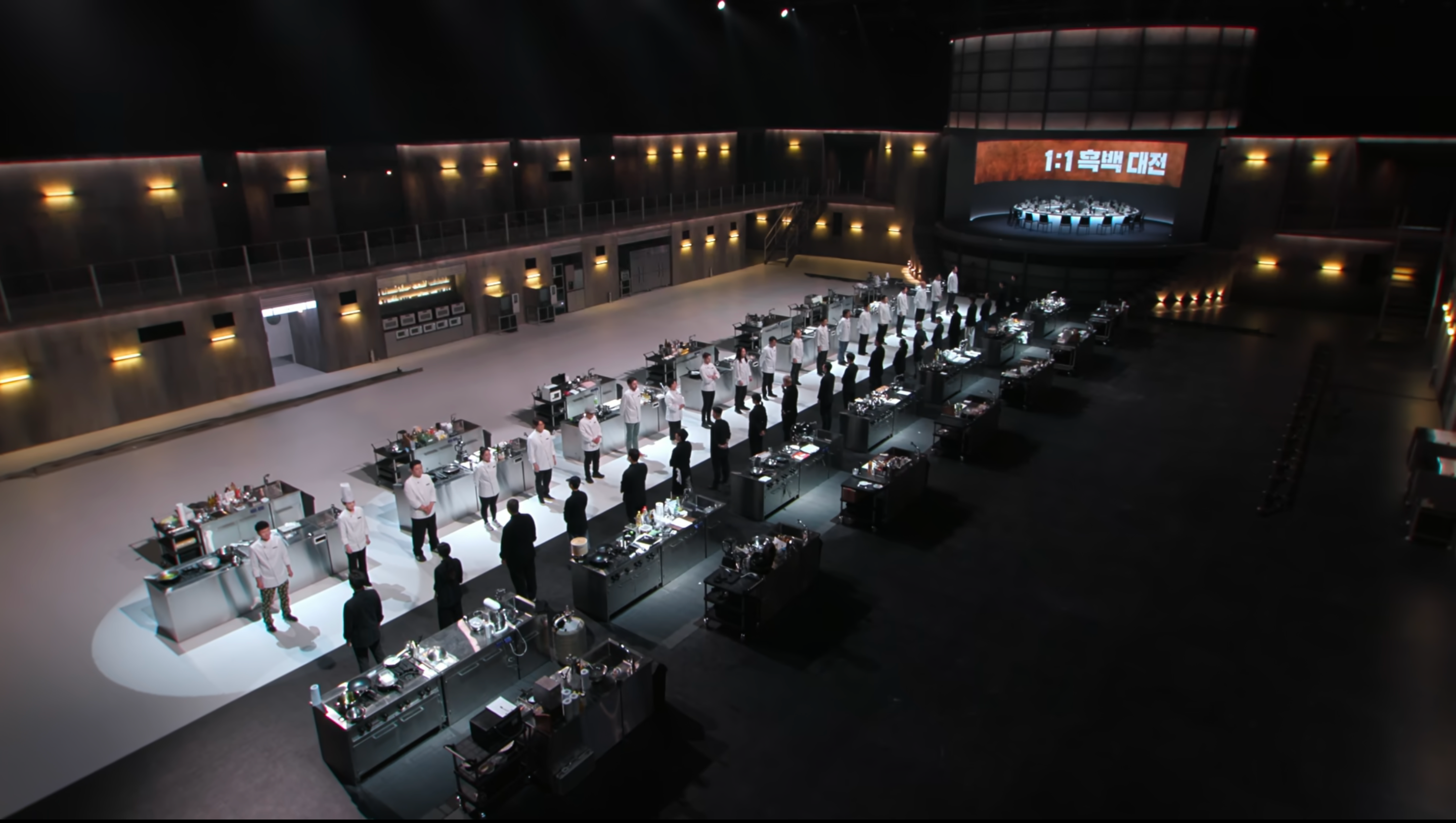Since their inception, food competition shows have seen very little real innovation. Most entries into the genre are variations on a theme, the stakes artificially raised through less time allotted, increasingly sadistic ingredient choices or semi-regular trauma dumps. There's something deliberately anesthetizing in this; in the same way that I know a Starbucks sous vide egg bite will taste the same whether I buy it in New Jersey or Texas, I know what I'm in for when I turn on Chopped or Great British Bake-Off or Top Chef.
At first glance Culinary Class Wars, Netflix’s newest entrant into this gastronomical pantheon, looks to be yet another of these variations. There are familiar elements at play here; two celebrity judges, mystery ingredients and seemingly rigged team challenges make frequent appearances. But by the end of the first episode, it’s abundantly clear that the creative minds behind Physical: 100 and The Influencer have managed yet again to create a reality show with an elusive secret ingredient: novelty.
The show’s premise is deceptively simple: 100 of South Korea’s finest chefs all compete to win a prize of 300 million won (roughly $217,000 USD). But before they can even turn on a gas range, the chefs are split into two classes: 20 White Spoons and 80 Black Spoons. The White Spoons are all titans of their industry with more than a handful of Michelin stars between them. Their first appearance on screen drew cries of admiration and shock from the rest of the contestants, the Black Spoons, who are all well-respected chefs within their own right but who also, on average, possess at least 20 years' less experience than their White Spoon counterparts. It’s a classic generational battle, and at first the heckling jeers tossed between the two groups falls into familiar age versus beauty territory. But there is a clear, mutual admiration between the two groups of contestants by the end of the first episode, which sees the Black Spoons whittled down to 20 chefs while the more established White Spoons sit pretty and watch.
The class divide breaks down almost immediately thanks to the formulation of the first challenge. Each Black Spoon chef must prepare their signature dish which is then judged by the aforementioned celebrity chefs: famed restaurateur Paik Jong-won and the only three-star Michelin chef in South Korea, Anh Sung-jae. The standards are exacting, so much so that the onlooking veteran White Spoons grow fearful of their turn in the judging spotlight. At one point, Anh eliminates a contestant because they didn’t serve their dish with rice. Another contestant is put on hold because Anh found “the seasoning on the fish a bit lacking, though not by much.” One of the observing older chefs remarks, “If he’s gonna be that picky, I feel like no one’s going to make the cut.” Another dubs Anh the “grim reaper of seasoning.” Here, too, Culinary Class Wars innovates. Despite their position as judges, Paik and Anh don’t hold themselves above the competitors they’re judging. By the end of the competition, one of the contestants remarks that the judges no longer feel like distant magistrates but like two regulars at his restaurant; it helps that, in the course of judging, Paik and Anh are put into positions just as absurd as the contestants they're assessing. Over the course of 10 increasingly grueling episodes, both demonstrate a willingness to get their hands dirty–at one point, Paik eats a leftover piece of steak from a discarded plate in a garbage bin to check its doneness.
The second challenge, a head-to-head match between Black Spoon-White Spoon pairs, is judged blind. Each pair is given a mystery ingredient and 70 minutes to create a dish that Paik and Anh appraise based on taste alone. It’s a form of physical comedy, watching both of these titans of their industry grope blindly with their mouths for spoonfuls of food they can’t see that are being delivered to them by nameless assistants. Halfway through the challenge, both Paik and Anh boast visible indentations on their faces from the cloth blindfolds they wear. In one of the most brutal challenges I’ve ever witnessed, the seven final chefs enter what Culinary Class Wars calls "Infinite Cooking Hell." Using a mystery ingredient, each contestant must execute a new recipe every 30 minutes until only one chef remains. By the end of "Infinite Cooking Hell," the final two chefs have developed and cooked six different recipes in three hours. Paik and Anh consume more than two dozen tofu dishes in the same amount of time.
Maybe it’s no surprise that by the end of the season, Culinary Class Wars feels far more like a feat of endurance than one of culinary prowess. It makes sense, given that the show comes from the same team that created the grueling challenges seen in Physical: 100. But perhaps that’s why I and others (spoilers in links) found the finale of Culinary Class Wars a little disappointing. One of the more gratifying elements of the show, to me at least, is how consistently the show demonstrated the force multiplier of experience. Creative fields like cooking (and blogging) tend to equate novelty with youth. In the constant quest for innovation, for eating or reading something never seen before, wunderkinds tend to win out. Culinary Class Wars has plenty of those, including one who an elder statesman contestant referred admiringly to as “a pervert when it comes to cooking.” But in what I consider to be the most objective challenge, the blindly judged Black Spoon-White Spoon deathmatches, the White Spoons edged out their younger counterparts, winning 11 matches out of 20. There are also at least two Black Spoon victors, one a school lunch lady, who are significantly older than their opponents but who still manage to best them.
For most of my career, I’ve been one of the youngest people in the room, my age both asset and albatross. As I chafed under paternalism, I was dogged by the sense that one of my most important qualifications was the thing I had the least control over. In the back of my mind, there is this lingering question I first remember reading in a blog from my colleague Kelsey McKinney’s old newsletter Written Out: “It doesn’t really matter how old you are unless you are trying to be a wunderkind,” she wrote. “Unless you’ve been told that the reason you’re good is because you are young, because no one your age should be able to do that. But then what happens when you turn 40? Or 30, even? People those ages should be able to do the job you’ve always done. And then where are you?”
Youth isn’t steady ground to build a career on, but as the time-tested White Spoons demonstrated over and over again, diligence and knowledge are a formidable combination. It's a given that technical skills such as knifework or grammar benefit from experience. But I've also seen expertise come at the expense of creativity; a signature style become a cage. Saying experience or age always wins may sound like conventional wisdom, but in cooking—and especially a food competition—expertise can translate into the confidence necessary to transcend safe choices.
There was a brilliance to the dishes prepared by the White Spoons; one of the most frequent compliments paid by the judges was along the lines of I’ve never tasted anything like this before. That decades spent tasting and testing would yield truly singular dishes might seem obvious. But as I watched Paik and Anh blindly swallow meatballs and dumplings whole, I found the steady stream of White Spoon victors strangely encouraging. Down to the finale, the most ingenious meals came from the veteran chefs; there was a confidence they possessed, not just in having a vision, but executing it. It was the sort of confidence that results from decades spent honing a skill, a confidence that’s now muscle memory. Watching Culinary Class Wars reminded me of the feeling I get from powerlifting. There can be immense rewards from endless repetition, of doing something over and over and over again, until you can do just a little bit more than you could before.






